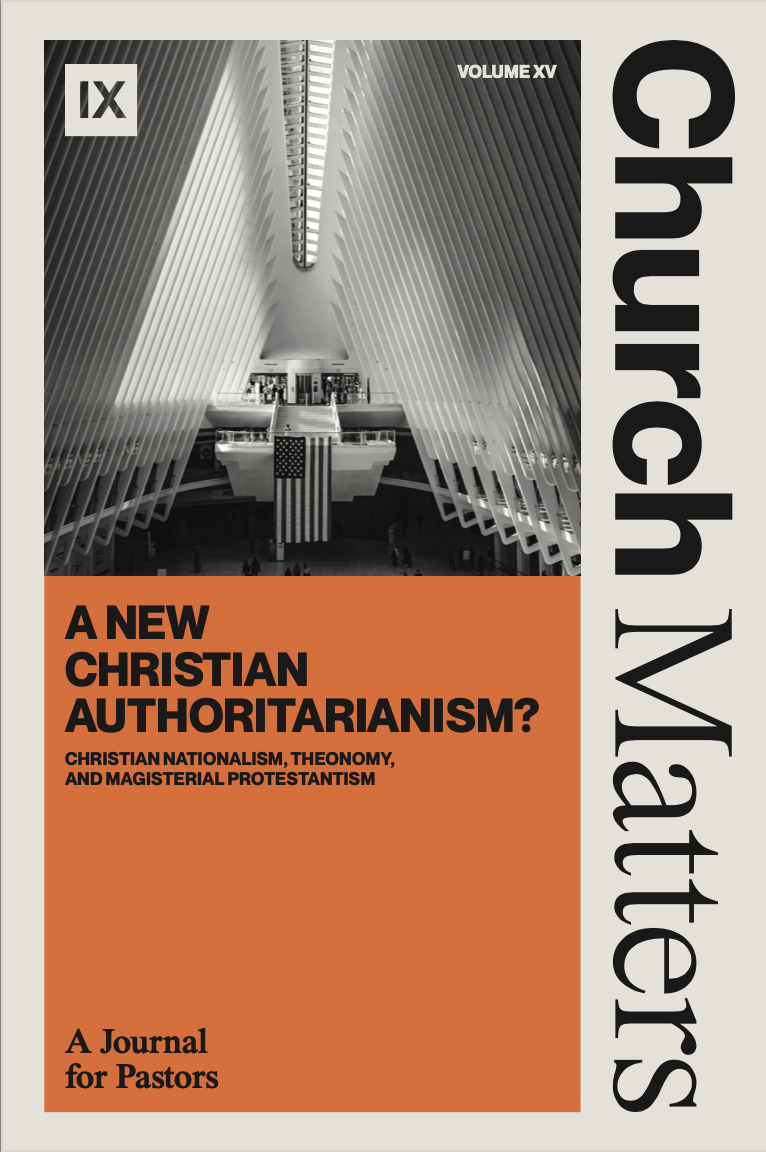Utopian Seductions
Those familiar with the wider historical contours of Christian political theology find little new in the resurgent nationalism of our moment. Nationalist sentiment has come and gone, each time a different flavor, perhaps, but always the same recognizable brand.
I do not have space here to account for all the continuities between movements but will focus instead on one point of continuity that links all nationalist movements, Christian or otherwise: the utopian impulse. Christian nationalism succumbs to utopian seductions. It dreams of initiating today a political order reserved for the life to come and, as such, eschews the eschatological nature of Christ’s kingdom and the principle tasks of the church.
What is the question to which Christian nationalism is the proposed solution?
Its ascendancy has caught many by surprise, in turn sounding the usual alarms and provoking a steady spate of apologies. A glance at social media reveals a thicket of conflicting viewpoints and tangled reply threads that terminate in a slow realization that discourse is only getting less clear. We have received several accounts explaining why it has arisen, but have yet to consider how Christian nationalism is a solution. I suggest it is not so much a political project as it is a sentiment. Projects have plans, and CN has no observable or unifying plans, none beyond civil enforcement of the Decalogue. It is first a brooding mood of political disaffection.
Putting the matter simplistically, many believe the regnant liberal order of the past half century to be irrecoverably imperiled. It failed to maintain adequate social equilibriums. Culture rots before our eyes, institutions are impoverished, society is fractious, and our noblest collective aims have vanished from sight.
Thus, the question to which Christian nationalism is the answer goes something like: in light of liberalism’s collapse, to what may Christians turn to re-establish the vital forces integrating and animating a healthy society?
Not an insensible question on its face. But why is Christian nationalism the answer?
First, some important distinctions. To begin with, there isn’t one Christian nationalism on offer today, but many nationalisms. There are as many iterations and priorities as there are Twitter accounts. For some, the aim is simple church establishment. For others, the aim is greater governmental respect for the moral law. For still others, the larger segment by far in my view, Christian nationalism is another name for paternal patriotism or soft authoritarianism. None of these iterations bear meaningful similarity with modern European national churches, which have establishment traditions and constitutions unshared by the U.S. They are politically novel.
The resurgence of Christian nationalism is attributable in part to the highly elastic nature of the concept. One of the more vocal advocates has referred to nationalism as a nation becoming conscious of itself. The “Christian” character of nationalism is equally variegated, assuming incorrectly that individual conceptions of “Christian” are uniform. The chief advantage of this conceptual elasticity is that it invites sympathizers to suffuse their own individual meanings. As a result, what is meant by “nation” or “Christian” is ultimately subjective.
Christian nationalism has three basic moves: (1) observing the imperiled state of modern liberalism as no longer politically serviceable, it (2) argues for universal religiosity (i.e., that all societies are religious in a strict sense) and, (3) since only one religion can be true, society should in principle be governed by the true religion. Secularity is a false religion that failed to sustain social order, so why not try for Christian governance? The truth is superior to the false.
Let us note explicitly several of the necessary conditions that must exist for Christian nationalism to be formally established. First, the concept of “nation” must have a clear rationale, including whom precisely it encompasses and why. Second, that nation must specify decisively what counts as “Christian” and what does not; Christianity being the one True Religion requires formal judgment on ethnic or confessional expressions as valid or invalid. Third, a mass conversion of modern polytheistic society to Christian monotheism must occur. If that feat is accomplished, then, fourth, the nation must secure near-universal agreement on the essentials of Christian governance and statecraft. A tall order, admittedly, and this names only a few such conditions.
Here we may turn to an unlikely source.
AN OLD BOOK
In the latter section of his semi-satirical Utopia, Thomas More portrays religion in terms both vivid and biting. A variety of religions exist on his fictive island, but the “greater and wiser” members acknowledge only one Supreme Being who deserves glory and honor. More and his visiting entourage preach Christ to the inhabitants, and in due course, many islanders believe and are baptized. “Those among them that have not received our religion do not fright any from it,” says More, “and use none ill that goes over to it, so that all the while I was there one man only was punished on this occasion.”
That man was punished not for his religious belief, but for inflaming the people to sedition. One of their ancient laws, after all, is “that no man ought to be punished for his religion.” The law bears the wisdom of past experience. Having been once rife with religious conflict, the people had adopted an alternative political stance in which no religious compulsion can be imposed upon another save that of persuasion and gentleness.
This relaxed law was among the first promulgated by the founding authority, Utopos. He felt it necessary “not only for preserving the public peace, but because he thought the interest of religion itself required it.” Valuing wisdom above all, “he therefore thought it indecent and foolish for any man to threaten and terrify another to make him believe what did not appear to him to be true.” No one can be forced to believe and thus no one ought to be punished for disbelieving:
And supposing that only one religion was really true, and the rest false, [Utopos] imagined that the native force of truth would at last break forth and shine bright, if supported only by the strength of argument, and attended to with a gentle and unprejudiced mind; while, on the other hand, if such debates were carried on with violence and tumults, as the most wicked are always the most obstinate, so the best and most holy religion might be choked with superstition, as corn is with briars and thorns; he therefore left men wholly to their liberty, that they might be free to believe as they should see cause.
There’s a just-so-ness to the ordering of religion in Utopia. Temperamentally latitudinarian, we might say.
More, writing at a time of religious upheaval, was pessimistic about using coercion as a means of solving religious conflict. It didn’t seem effective to him, nor could he identify in the New Testament warrant for soft authoritarianism. If the True Religion is really true, then it will unmake falsehood the way light unmakes darkness. It will persuade. The message of the church is persuasive in itself and bolstered by righteous acts of the faithful. Good works are a highly effective means of persuasion.
Christian nationalists respond to such arguments by affirming the ideal but arguing the ideal is unrealistic. It is one thing to maintain tolerance toward diverse religious perspectives, they argue, but quite another to tolerate inevitable conflicts arising from these diverse communities’ pursuit of discordant ends. Every religion presumes its own rectitude. Adherents believe their religious beliefs are true and that they should act on the basis of that truth. But when religions are widely discordant about ends, a society must decide on the exact limits of political toleration. More’s Utopia is just that, after all—a fictitious society perfectly ordered. Real societies must have real political limits.
LIMITS HOW?
It was precisely these sorts of limits that resulted in More’s own beheading by King Henry VIII when he refused to take the oath of royal supremacy recognizing the king as head of the English church. The example More makes of the one man punished for sedition, but not specifically his religious beliefs, raises a natural question as to what constitutes sedition in the first place.
Modern political liberalism employs the concept of an “overlapping consensus”—in John Rawls’s words—in order to create a space for tolerance. Yet a society may still change its mind about what it is willing to tolerate. Standards of tolerance are perpetually negotiated. Is protesting peacefully outside an abortion clinic seditious? What about a militant cult living off the grid and stockpiling munitions in preparation for a future apocalypse? May clergy refuse to accept a person’s preferred pronouns? Further examples can be easily imagined. Exactly when is the limit of toleration breached?
This perpetual negotiation is exactly what proponents think CN resolves by drawing clearly defined limits on freedom and tolerance.
But does it? Beyond enforcement of the first and perhaps second table of the Decalogue, does it offer a clear and coherent set of limits and tolerances? Future states of affairs in which Baptists are legally compelled to baptize their children or Catholics to foreswear allegiance to the pope are easily imagined. But to what standards of justice will religious authorities appeal in prosecuting fellow Christians for deviance?
This question about the outer limits of tolerance raises another one: at what point will we know that the Christian nationalist project has succeeded? What are the relevant evaluative criteria? Need it only be appreciably better than late democratic liberalism? I think no great answer is forthcoming to such questions.
History is full of surprises. Perhaps one day it will defy the odds, who can say? But I would remind us of a key insight of More’s Utopia, and indeed of past utopian experiments—that when we attain what we thought we wanted most, we find the achievement bittersweet, failing to deliver fully on the promise we endowed it with.
On the longer historical view, more often than not, a power secured and consolidated is just as quickly lost. Wielding authority is notoriously precarious.
It isn’t crazy to think that closer adherence to the first table of the law, say, would improve the social order in comparison to contemporary liberalism. But if that is an attractive destination, as many believe it is, how will any society begin deliberately to traverse the expanse between here and there? Institutional renewal is indispensable, but that cannot occur without first garnering more widespread support for such an involved cultural undertaking. In other words, to even begin such a political quest, Christians need (far) more Christians!
Because it is utopian, Christian nationalism in the United States is idealist rather than realist. To become realist would be to forfeit all of its seductive force, since the realist, by contrast, accepts the contingencies of time and place, accepts the call God has extended to lead quiet, peaceable lives, to serve neighbors and to await the time God has appointed to judge and restore creation. The perfect order we seek is reserved for the life to come.









